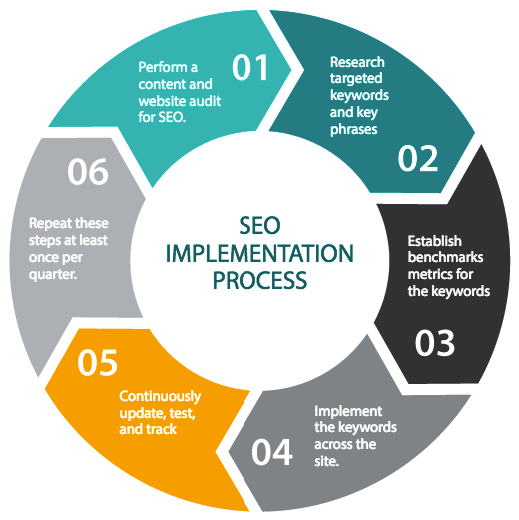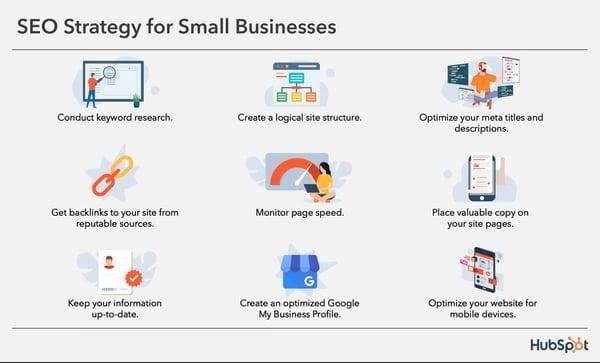Uncover the essential steps to launching your own successful SEO business and dominate the digital marketing world today.

Image courtesy of via DALL-E 3
Table of Contents
Introduction to SEO
Search Engine Optimization (SEO) is like the magic potion that helps businesses shine bright in the vast online world. Imagine a search engine as a massive library full of books. When someone searches for something, the search engine has to quickly find the best books that match what the person is looking for. SEO is what helps websites become those top books in the library, making sure people find them easily.
What is SEO?
SEO stands for Search Engine Optimization, and it’s all about making websites show up higher in search engine results. This means more people can see the website and visit it. It’s like putting up a big, bright sign that says, “Hey, come check out this awesome website!”
Why SEO Matters
Think of SEO as a superpower for online businesses. The better a website’s SEO is, the more likely it is to get noticed by people who are searching for things related to that business. This attention can lead to more visitors, potential customers, and ultimately, more success for the business. So, understanding and using SEO is crucial for any business looking to shine online.
Starting an SEO Business
Starting your own SEO business can be an exciting and rewarding venture. If you are passionate about helping websites improve their search engine rankings, then this may be the perfect opportunity for you. Let’s dive into the fundamental steps you need to take to start your own SEO business.
Research and Learn
Before diving into the world of SEO, it’s crucial to spend some time researching and learning about the industry. Start by gathering information about what SEO is and how it works. Understand the basics of keyword research, on-page optimization, and backlink building. The more you know, the better equipped you will be to help your clients succeed.
Create a Business Plan
Just like any other business, starting an SEO business requires a solid business plan. Your plan should outline your business goals, target market, pricing strategy, and marketing plan. Having a clear roadmap will not only guide you in the early stages but also help you stay focused as your business grows. Remember, a well thought out business plan is the foundation for a successful SEO business.
Necessary Tools and Software
Running a successful SEO business requires access to specific tools and software that help streamline processes and enhance efficiency. Below, we’ll explore two essential categories of tools that every SEO business owner should consider utilizing.
Image courtesy of fitsmallbusiness.com via Google Images
Keyword Research Tools
Keyword research is a crucial aspect of SEO, as it helps identify the terms and phrases that potential customers are searching for online. Tools like Google Keyword Planner, SEMrush, and Ahrefs can assist in finding relevant keywords with high search volumes and low competition. These tools provide valuable insights into popular search queries, allowing you to tailor your content to target specific keywords effectively.
Analytics Tools
Understanding the performance of your website and the effectiveness of your SEO strategies is vital for optimizing your business. Analytics tools such as Google Analytics and Moz Pro offer detailed data on website traffic, user behavior, and keyword rankings. By analyzing this information, you can make informed decisions to improve your SEO efforts and provide better results for your clients.
Building a Team
Building a successful SEO business requires a team of experts who are knowledgeable in various aspects of search engine optimization. To find the right people for your team, start by looking for individuals with a solid understanding of SEO techniques and strategies. You can search for candidates on job boards, social media platforms, or through networking events. Make sure to review their experience and ask for references to ensure they are the right fit for your business.
Roles and Responsibilities
When assembling your SEO team, it’s essential to define the roles and responsibilities of each team member. Here are some key roles commonly found in an SEO team:
- SEO Specialist: Responsible for implementing on-page and off-page optimization strategies.
- Content Creator: In charge of creating high-quality and engaging content for websites.
- Link Building Specialist: Focuses on acquiring high-quality backlinks to improve website authority.
- Analyst: Monitors website performance using analytics tools and provides insights for improvement.
By clearly outlining the responsibilities of each team member, you can ensure that everyone is working towards the same goals and contributing to the overall success of your SEO business.
Creating Your Website
When creating a website for your SEO business, it’s important to keep design principles in mind. Make sure your site is easy to navigate, visually appealing, and mobile-friendly. Use colors and fonts that represent your brand professionally. Remember, a well-designed website can leave a positive impression on potential clients.

Image courtesy of www.trendingupstrategy.com via Google Images
Showcasing Success
To attract clients to your SEO business, it’s vital to showcase your success stories and case studies on your website. Highlight the results you’ve achieved for your clients, including improved search engine rankings, increased website traffic, and enhanced online visibility. This helps build credibility and trust with potential clients who visit your site.
Marketing Your SEO Business
Once you have set up your SEO business, it is essential to market and promote your services to attract clients. Online marketing can be a powerful tool to reach a larger audience and showcase your expertise. Utilize social media platforms like Facebook, Instagram, and LinkedIn to engage with potential clients. Regularly post updates, helpful tips, and success stories to demonstrate your skills and attract attention.
Networking
Networking is another crucial aspect of marketing your SEO business. Building relationships with other businesses, industry professionals, and potential clients can open up new opportunities and referrals. Attend networking events, conferences, and webinars related to digital marketing to connect with potential clients. Collaborating with other businesses can also help you expand your reach and grow your client base.
Providing Excellent Service
Communication is key when it comes to providing excellent service to your clients. It is essential to keep them informed about the progress of their SEO projects, answer any questions they may have, and listen to their feedback. Regular updates and open lines of communication create trust and show your clients that you value their business.

Image courtesy of blog.hubspot.com via Google Images
Delivering Results
One of the most crucial aspects of providing excellent service in the SEO business is delivering tangible results. Your clients entrust you with improving their online presence and driving more traffic to their websites. It is essential to demonstrate the effectiveness of your service by showing them the measurable outcomes of your work, such as increased website traffic, higher search engine rankings, and improved conversion rates. By consistently delivering positive results, you will not only retain your current clients but also attract new ones through word-of-mouth recommendations.
Growing Your SEO Business
Expanding your SEO business is an exciting step that will allow you to reach more clients and increase your revenue. Here are some strategies to help you scale and grow your business:
Expanding Services
One way to grow your SEO business is by expanding the services you offer. As you gain more experience and expertise, you can add new services such as content marketing, social media management, or email campaigns. By diversifying your offerings, you can attract a wider range of clients and increase your revenue streams.
Investing in Training
Continual learning and development are essential for the success of your SEO business. Investing in training programs, workshops, and courses can help you stay up-to-date with the latest trends and techniques in the ever-evolving field of SEO. By constantly improving your skills and knowledge, you can better serve your clients and differentiate yourself from competitors.
Summary of Key Points
Starting an SEO business involves understanding the basics of SEO and its importance for online businesses. By improving search engine rankings, businesses can grow and reach more customers.

Image courtesy of www.alamy.com via Google Images
What is SEO?
SEO stands for search engine optimization, which helps websites appear higher in search engine results. It involves using specific techniques to increase visibility and drive more traffic to a site.
Why SEO Matters
SEO matters because it can significantly impact a business’s online presence. By optimizing their website for search engines, businesses can attract more visitors and potential customers, leading to increased revenue and growth.
Starting an SEO Business
When starting an SEO business, research and learning are crucial. Understanding the fundamentals of SEO and creating a detailed business plan are essential steps to success in this industry.
Research and Learn
To start an SEO business, it’s essential to gather information about SEO practices and trends. Learning the basics of keyword research, content optimization, and backlink building can help lay a strong foundation for your business.
Create a Business Plan
Creating a business plan is vital for any startup, including an SEO business. Your plan should include details about your target market, services offered, pricing strategies, and marketing tactics to help guide your business towards success.
Necessary Tools and Software
Running an efficient SEO business requires the use of various tools and software to streamline processes and optimize performance. Utilizing keyword research tools and analytics tools can help you better understand your clients’ needs and track website performance effectively.
Keyword Research Tools
Keyword research tools like SEMrush and Ahrefs can help you identify the best keywords to target for your clients’ websites. By understanding search volume and competition, you can develop effective SEO strategies to improve their online visibility.
Analytics Tools
Analytics tools such as Google Analytics provide valuable insights into website performance and user behavior. By analyzing data on traffic sources, user engagement, and conversion rates, you can optimize your SEO efforts and deliver tangible results to your clients.
Building a Team
Assembling a team of skilled SEO experts is essential for handling the various aspects of SEO effectively. Finding the right professionals and defining clear roles and responsibilities can help optimize your team’s performance and deliver exceptional results to your clients.
Finding Experts
When hiring SEO experts for your team, look for individuals with a strong background in SEO and a passion for staying up-to-date with industry trends. Conducting thorough interviews and reviewing portfolios can help you find the right talent to drive your business forward.
Roles and Responsibilities
Each member of your SEO team should have defined roles and responsibilities to ensure smooth operations and effective collaboration. From content creation and link building to technical SEO and performance analysis, clarity on roles can enhance productivity and client satisfaction.
Creating Your Website
Developing a professional website for your SEO business is essential for showcasing your services and attracting potential clients. By focusing on simple web design principles and highlighting case studies and success stories, you can build credibility and trust with your audience.
Design Basics
When designing your SEO website, prioritize user experience and mobile responsiveness to ensure visitors can easily navigate and access your content. Clear navigation, relevant visuals, and compelling calls-to-action can encourage visitors to engage with your services and reach out for inquiries.
Showcasing Success
Displaying case studies and success stories on your website can demonstrate your expertise and the positive outcomes you’ve achieved for your clients. Highlighting results and testimonials can build trust and credibility with potential clients, encouraging them to choose your services for their SEO needs.
Marketing Your SEO Business
Promoting your SEO business through online marketing and networking can help you attract clients and expand your reach in the industry. Leveraging social media, content marketing, and building relationships with other businesses can create opportunities for growth and client acquisition.
Online Marketing
Utilize online marketing strategies like social media and email marketing to reach a wider audience and promote your SEO services. Creating engaging content, running targeted ads, and engaging with your followers can increase brand awareness and attract potential clients to your business.
Networking
Networking with other businesses and industry professionals can open doors to collaborations, referrals, and new opportunities for your SEO business. Building relationships and establishing a strong presence in your industry can lead to valuable partnerships and client connections that drive business growth.
Providing Excellent Service
Delivering exceptional customer service and demonstrating the effectiveness of your SEO services are essential for retaining clients and fostering long-term relationships. By communicating regularly with clients and showing tangible results, you can build trust and loyalty that keeps clients satisfied and engaged.
Communication
Maintaining open communication channels with your clients is crucial for understanding their needs, addressing concerns, and updating them on progress. Regular check-ins, progress reports, and responsiveness to inquiries can demonstrate your commitment to delivering high-quality service and value to your clients.
Delivering Results
Showing measurable results and improvements in your clients’ website performance is key to proving the effectiveness of your SEO services. Providing detailed reports, explaining data insights, and showcasing progress over time can validate your strategies and build confidence in the value you bring to their business.
Growing Your SEO Business
Scaling and expanding your SEO business require strategic planning, adding new services, and investing in ongoing training and development. By diversifying your offerings and staying ahead of industry trends, you can position your business for sustained growth and success in the competitive SEO market.
Expanding Services
Consider expanding your services beyond traditional SEO offerings to meet the evolving needs of your clients. Incorporating services like content marketing, social media management, and web design can create additional revenue streams and provide comprehensive solutions for businesses looking to enhance their online presence.
Investing in Training
Ongoing learning and professional development are essential for staying competitive in the dynamic field of SEO. Investing in training programs, attending industry conferences, and pursuing certifications can help you expand your skills, stay informed about industry best practices, and offer cutting-edge solutions to your clients.
Want to turn these SEO insights into real results? Seorocket is an all-in-one AI SEO solution that uses the power of AI to analyze your competition and craft high-ranking content.
Seorocket offers a suite of powerful tools, including a Keyword Researcher to find the most profitable keywords, an AI Writer to generate unique and Google-friendly content, and an Automatic Publisher to schedule and publish your content directly to your website. Plus, you’ll get real-time performance tracking so you can see exactly what’s working and make adjustments as needed.
Stop just reading about SEO – take action with Seorocket and skyrocket your search rankings today. Sign up for a free trial and see the difference Seorocket can make for your website!
Frequently Asked Questions (FAQs)
How much should I charge for my services?
Deciding on your pricing strategy is crucial when starting an SEO business. The amount you charge for your services can vary depending on factors such as the scope of work, the level of expertise required, and the market demand. It’s essential to research what other SEO businesses in your area are charging to remain competitive.
Consider offering different packages at different price points to cater to a variety of clients. You can also offer customizable options to meet specific client needs. Remember, pricing your services too low may devalue your expertise, while setting a price that is too high may deter potential clients.
How do I handle difficult clients?
Managing challenging client relationships is an inevitable part of running an SEO business. The key to handling difficult clients is effective communication and setting clear expectations from the start. Listen to your clients’ concerns and address them promptly to prevent misunderstandings.
If a client becomes unreasonable or overly demanding, it’s essential to remain professional and calm. Set boundaries for what you can and cannot deliver, and be transparent about the limitations of your services. In some cases, it may be necessary to part ways with a difficult client if the relationship becomes unproductive or toxic.







